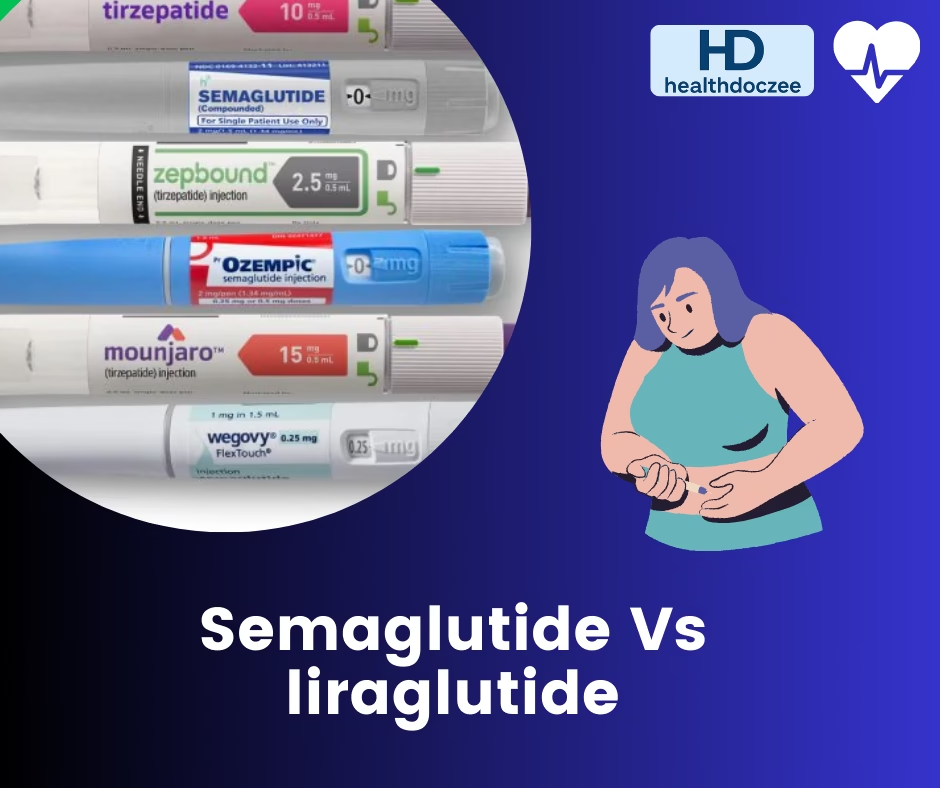In recent years, GLP-1 receptor agonists like semaglutide and liraglutide have revolutionized the treatment of type 2 diabetes and obesity. With the rising popularity of these medications, especially for weight loss, it’s essential to understand their differences to make an informed decision. This article provides a comprehensive comparison of semaglutide and liraglutide, focusing on their efficacy, dosing, side effects, and more.

Semaglutide or liraglutide: Which is better for weight loss?
Both semaglutide and liraglutide are GLP-1 receptor agonists, a class of medications that mimic the incretin hormone GLP-1. They help regulate blood sugar levels and promote weight loss by increasing insulin secretion, decreasing glucagon secretion, and slowing gastric emptying.
Semaglutide: Available under brand names like Ozempic (for diabetes) and Wegovy (for weight loss), semaglutide is administered once weekly via subcutaneous injection.
Liraglutide: Marketed as Victoza (for diabetes) and Saxenda (for weight loss), liraglutide requires daily subcutaneous injections.
How long does it take to see weight loss with GLP-1?
Several studies have compared the weight loss outcomes of semaglutide and liraglutide:
Semaglutide: In a one clinical trial of approx. 68 weeks, participants using semaglutide 2.4 mg weekly experienced an average weight loss of 12.4% from baseline.
Liraglutide: In contrast, those on liraglutide 3.0 mg daily achieved an average weight loss of 5.4% over the 56 week period.
These findings suggest that semaglutide may offer superior weight loss benefits compared to liraglutide.
Semaglutide or Liraglutide in Sugar control
Both medications are effective in managing blood glucose levels in type 2 diabetes patients:
Semaglutide: Demonstrated significant reductions in HbA1c levels, with some studies reporting decreases of up to 1.5%.
Liraglutide: Also effective, with HbA1c reductions averaging around 1.23%.
While both are beneficial, semaglutide may have a slight edge in glycemic control.
Is GLP-1 taken daily or weekly?
Semaglutide: Administered once weekly, which may enhance adherence due to less frequent dosing.
Liraglutide: Requires daily injections, which might be less convenient for some patients.
The less frequent dosing schedule of semaglutide could improve patient compliance.
What are the major side effects of GLP-1?
Common side effects for both medications include:
- Nausea
- Vomiting
- Diarrhea
- Constipation
However, some differences have been noted:
Semaglutide: May have a higher incidence of gastrointestinal side effects, but these often diminish over time.
Liraglutide: Associated with a higher overall rate of side effects, though they may be less severe.
It’s essential to monitor for side effects and consult with a healthcare provider if they persist.
How expensive is GLP-1?
Cost can be a significant factor in choosing between these medications:
Semaglutide: Generally more expensive, with estimated cost around $22,878 in a study .
Liraglutide: Slightly less expensive, with cost approximately $17,585 in the same study.
Insurance coverage and patient assistance programs may offset these costs, so it’s advisable to consult with a healthcare provider or insurance representative.
Are GLP-1 compounds safe
Both medications have been associated with certain risks:
Thyroid C-cell tumors: Observed in rodent studies; relevance to humans is uncertain.
Pancreatitis: Reported in some patients; monitoring for symptoms is recommended.
Patients with a personal or family history of medullary thyroid carcinoma or multiple endocrine neoplasia syndrome type 2 should avoid these medications.
What’s better, liraglutide or semaglutide?
Both semaglutide and liraglutide are effective GLP-1 receptor agonists for weight loss and type 2 diabetes management. Semaglutide may offer greater weight loss and more convenient dosing, while liraglutide might be more accessible cost-wise. The choice between them should be based on individual patient needs, preferences, and medical history. Consulting with a healthcare provider is crucial to determine the most appropriate treatment option.






Leave a Reply